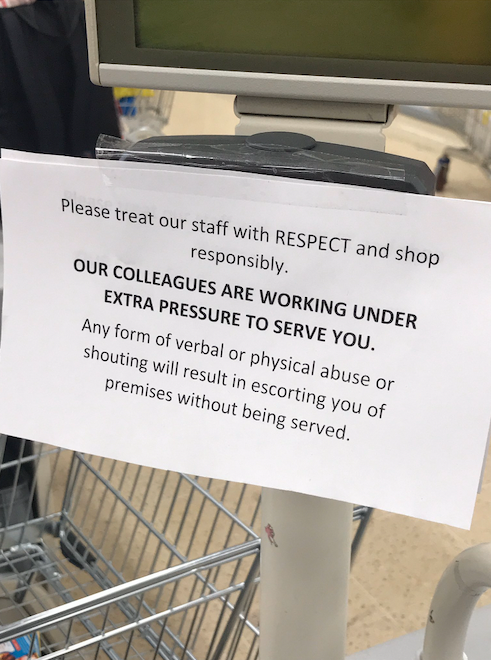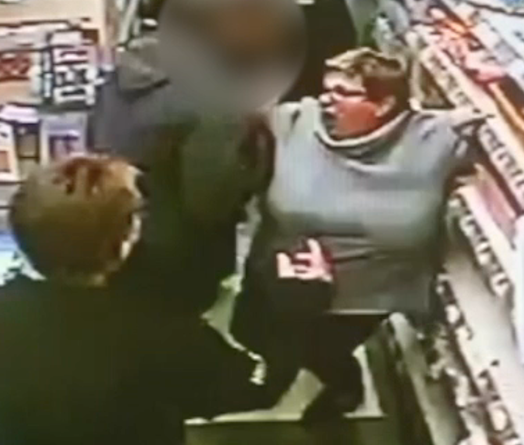ATTACKED AT WORK
Every year, 155,000 shop workers are violently attacked or verbally abused in the UK. Jamie Long reports on who should be protecting shop workers, as a parliamentary review into the issue is delayed.

The British Retail Consortium (BRC), the trade association for all UK retailers, released their latest Retail Crime Survey in March.
The report has shown that there were 424 incidents of violence and abuse against shop workers every day of the year, for the period 2018/19. This is an increase of 9% from the previous years' figures.
There are various triggers which have been identified by the BRC. These triggers can often lead to shop workers having to endure threatening or violent behaviour directly from the customers they serve every day. These triggers include enforcing age-restricted sales, such as asking for ID for alcohol and tobacco, dealing with intoxicated persons and encountering theft.
Furthermore, when surveyed, shop owners and retail workers explained that they are seeing an increase in the number of weapons, particularly knives, being used during incidents in store.
But, how can shop workers be better protected and who has the responsibility to ensure that they are safe whilst serving the public?
The Victim
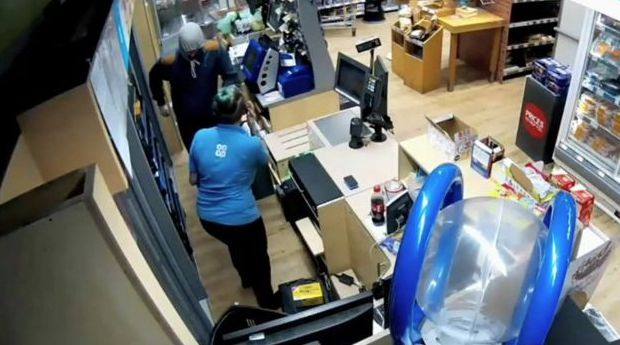
CCTV image of a separate incident at a Co-Op store.
CCTV image of a separate incident at a Co-Op store.
Violent and abusive incidents can have a significant and long-lasting impact on shop workers who experience them; this includes pre-meditated attacks.
'Mary', whose name we have changed, worked in a Co-Op store in Sittingbourne in 2007 when a group of men came in to raid the shop.
Mary was 16 when the incident happened at around 9:30 in the evening and, thirteen years on, the incident still has an impact on her life. Mary asked us to change her name because she still suffers from severe anxiety caused by the events.
"We were winding down to close up for the night, when a group of men with masks and hammers entered the store shouting 'this is a robbery'. Straight away I pushed the panic button which immediately sends a signal to the police.
"They made us open the tills and my supervisor was made to open the safe. There was also an elderly gentleman in the store who they pushed over; he just laid on the floor, not moving."
Mary explained that her direct management at the Co-Op were fantastic at the time:
"They gave me as much time off as I needed. I quit not long after the robbery because I just couldn't deal with being there. I didn't feel safe, so I didn't stay there."
You can read more about the work the Co-Op is doing later in the article, in Section 9 - 'Working together for a better future.'
The offenders were caught by police and handed a three month sentence for stealing £300 worth of cash and goods. However, Mary says that this isn't enough:
"I don't feel that a prison sentence helps because they just come out and do it again. I'd love to speak to them and tell them how it has impacted my life.
"They got away with £300, which probably just bought them their clothes for their next robbery. But, even thirteen years later, I'm constantly looking over my shoulder. 24/7 I hear a noise and turn around; I don't walk alone and I worry whenever I hear a noise in the house at night."
Mary isn't alone in experiencing incidents like this. A reminder that 424 violent and abusive incidents against shop workers are reported every day. Furthermore, it is reported that only 17% of actual incidents are actually reported, mainly due to a lack of confidence in the police.
To understand why, it's important to look at the contributing factors, along with who is responsible and how the issue can be solved.
Why does it happen?
There are various reasons why a customer may turn to violence or abuse against a shop worker. The British Retail Consortium (BRC) identified three major triggers, for example.
Click on the video below to hear from the experts about what sparks violent action or abuse.
One of the key causes is stopping shop lifters. Adrian Beck is a Professor of Criminology and explains that shop workers are a good deterrent but have to be careful in the way which they approach potential thieves.
James Martin is the Head of Crime at the British Retail Consortium and explains each of the three main triggers which were identified in their Retail Crime Survey.
Frank Woods is the Sector Lead for Retail at NFU Mutual and explains that, as well as the three main initiating factors, there are also three levels of abusive behaviour. He also explains where you may see higher levels of crime.
The Union of Shop, Distributive and Allied Workers (Usdaw) also identified various other triggers which their members reported to them. Take a look at the pie chart below to see what the triggers are, and how much of an issue they are compared to others.
But, why do people actually turn to acts of violence against shop workers and what is the mentality behind the behaviour?
Adrian Beck, Professor in Criminology, explains that it is hard to generalise across all forms of perpetrators. He also adds that there are lots of different reasons and factors. Listen to some of the reasons why somebody may turn to violence below:
The cost for businesses
Can you put a number on it?

According to the British Retail Consortium (BRC), a record £1.2 billion was spent on crime prevention across the retail industry in the year 2018/19.
During challenging trading periods businesses, both big and small, must ensure that they're protecting their business, their stock and their staff. However, the cost of doing so is an issue which is likely to arise amongst retailers.
The question of how much retailers should be spending on their own crime prevention is an interesting point for business owners too.
Frank Woods, the Sector Lead for Retail at NFU Mutual, explains the potential issues which business owners face from violent and abusive incidents, and how much they should be spending on protecting themselves and their staff:
"The business owners themselves will sometimes be the people on the receiving end of violence and abuse - this is a direct threat to them personally. There is also a major concern for their staff.
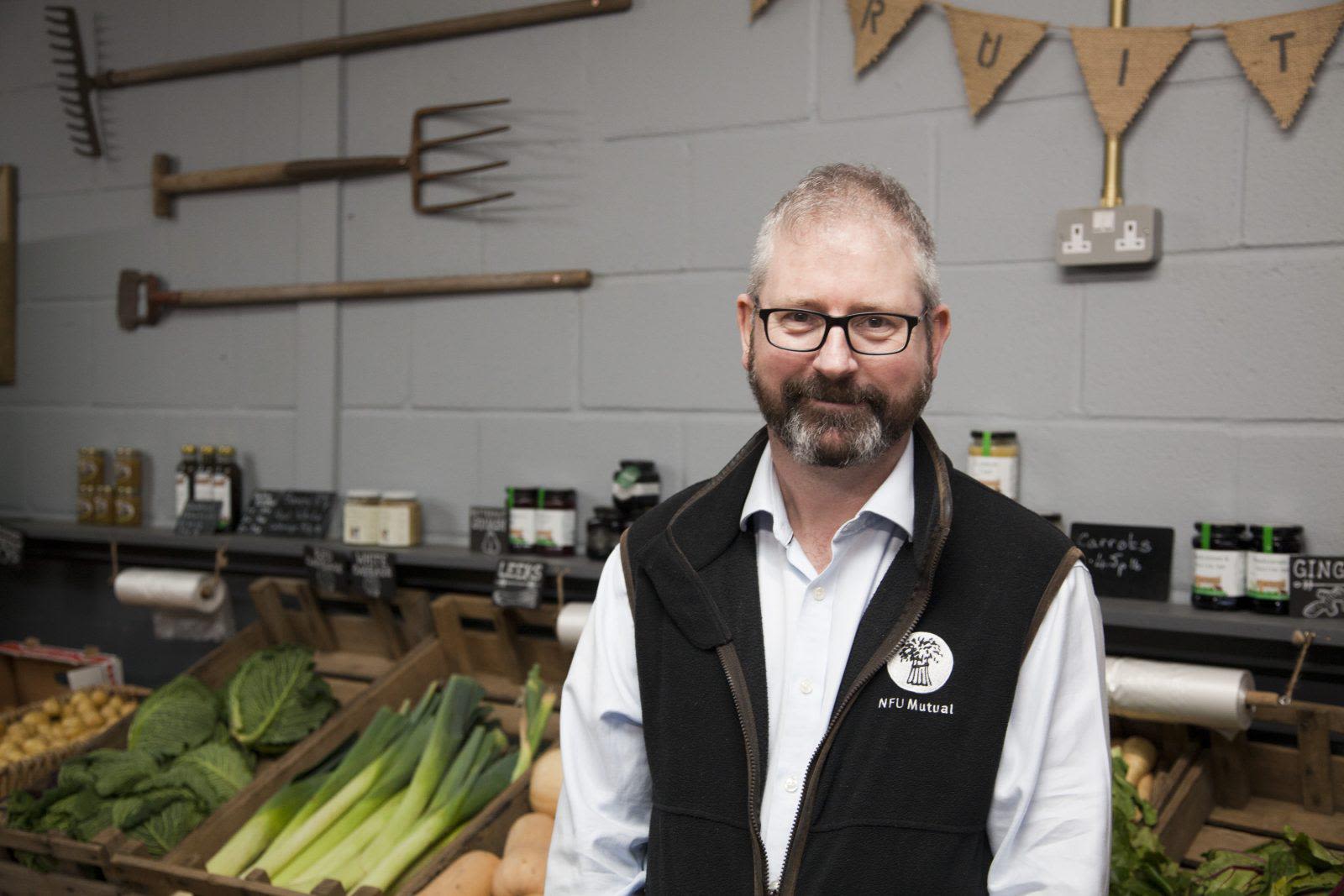
Frank Woods, Sector Lead for Retail at NFU Mutual. Credit: NFU Mutual
Frank Woods, Sector Lead for Retail at NFU Mutual. Credit: NFU Mutual
"The word reputation is just as important in retail as any other. Customers will choose where they shop based on a business's reputation. From a retail, business point of view, having a reputation for having a shop where there is often trouble will deter both potential staff and also customers.
"It needs to be seen as an investment in protecting their reputation. This doesn't necessarily mean that they have to spend a lot of money; a retailer will already have processes including cashing up and storing cash safely, along with the visibility and layout of the shop which optimises the safety and security of the staff. It doesn't really cost any more money but it can quickly change their position."
James Martin, Head of Crime at the British Retail Consortium (BRC), explains that the protection of colleagues is a human issue as much as a business issue. Furthermore, the money being spent on protecting themselves from crimes could be much better spent:
The BRC sees violence and abuse against shop workers as one of their key priorities. They are currently working to build better links between police forces, along with the home office on a response to the issue. They are also looking at better de-escalation training for individuals to reduce the likelihood of violence or abuse in stores.
Changing the Law
Parliamentary review delayed

A 'Violence and abuse toward shop staff' Call for Evidence was issued by the Government on April 5 2019. This consultation aimed to reach out to organisations and individuals to help the Government understand the problem in England and Wales. They particularly encouraged responses from retailers, trade associations and unions to share their views.
The consulation ended on June 28 2019 and, as per the Government's guidelines, the response was due in Autumn 2019. To this date of publication (May 5 2020), the Call for Evidence response has not been released. A source explained that all Government announcements that aren't related to COVID-19 are currently on hold. Therefrore, announcing their response to the Call for Evidence has been postponed. It will be published in due course but, at the moment, there is no indication when this will happen. The Home Office would not provide any further explanation.
Whilst the Call for Evidence response is long overdue, individuals, retailers and organisations have continued to voice their opinion on what they feel needs to be done. Some agree that the Government should take more responsibility, in a range of ways, whilst others believe retailers should pay closer attention to the safety of their staff.
Click below to hear the views of the experts:
Is there confidence in the police?
In a recent Westminster hall debate on February 11 2020, Mike Amesbury, the former Shadow Minister for Work and Pensions, said that community policing is vital to reduce the level of violence and abuse against shop workers. However, a lack of action by police means that few crimes are reported.
A Freedom of Information request has shown why there may be a lack of confidence in the police. I asked Devon and Cornwall Police to provide the number of offences recorded, between November 2018 and December 2019, where 'Retail Staff' was recorded as the occupation of the victim.
A total of 564 offences were recorded over the period, where the victim was described as 'Retail Staff'. These offences included 168 'common assaults' and 140 incidents where the offender used 'threatening / abusive / insulting words / behaviour to cause harassment / alarm / distress'.
Out of the total number of offences recorded, 321 resulted in an arrest.
However, out of the total 564 total offences recorded, only 47 lead to a conviction. That means only 8.33% of offences recorded by the force actually led to a conviction.
Furthermore, the Co-Op group sent a Freedom of Information request to every police force in the UK asking how often they have received a call about an incident in a Co-Op store and how often the incident was attended.
Paul Gerrard, Campaigns and Public Affairs Director at the Co-Op, said: "Not every police constabulary could provide this information because they don't record it, which is telling in itself. Those that could, told us that 2/3 of all incidents reported across the UK, the police never attended. That tells you something about the police response to the most serious incidents in store and whether they have the right resources to properly protect shop workers".

Paul Gerrard, Campaigns and Public Affairs Director at the Co-Op. Credit: The Co-Op Group
Paul Gerrard, Campaigns and Public Affairs Director at the Co-Op. Credit: The Co-Op Group
Stuart Reddish, President of the National Federation of Independent Retailers (NFRN) which represents and provides help to over 15,000 independent retailers, also agrees that shop workers aren't fully reporting incidents. He explains, however, that they aren't afraid of doing so:
Matthew Scott is Kent's Police and Crime Commissioner. He explained that people shouldn't feel under supported by his police force:
"Kent Police policy is that they will investigate every crime which has the opportunity of a lead. So, if you're a victim of assault or theft, I would very much advise that they report it. We have made it easier to report".
Matthew Scott's 2020 policing budget was also approved in February, which he says means there will be more police officers on the horizon: "What it will mean is: safer streets, more visible presence, more work with local skills and increasing the pressure even further on violent criminals, burglars and robbers who wish to do our county harm".
However, Kent's Police and Crime Commissioner also admits there is more that could be done:
The current law
It has been identified that attempting to stop a shop-lifter is one of the key triggers of abusive or violent behaviour against shop workers.
Guidance on the Anti-social Behaviour, Crime and Policing Act 2014 recognises that shop theft 'imposes significant costs on communities, businesses and the economy: over 80,000 cases of theft from a shop come before the courts each year'.
Section 176 of the Act makes theft from a shop, of goods worth £200 or less, a summary-only offence.
A summary-only offence means that, if an offender is taken to court, they will sit in front of a Magistrate with sentencing powers up to a maximum of 6 months imprisonment. However, some retailers, organisations and individuals do not feel that this is a deterrent to potential offenders.
Stuart Reddish, the President of the National Federation of Independent Retailers (NFRN), says that the £200 theft guideline is well known to offenders and has a significant impact for business owners:
However, Matthew Scott, Kent's Police and Crime Commissioner, explains that his force do not put limits on crime:
What is behind the violence?
Whilst there are a range of contributing factors that may lead to violent or abusive behaviour towards retail workers, including the theft threshold, the majority of retailers, individuals and organisations believe that there is much more beneath the surface.
Kate Green, Labour MP for Stretford and Urmston, believes that, along with sufficient and appropriate sentencing, there are underlying issues which need to be addressed.
A research report was carried out by Dr Emmeline Taylor, Criminologist at City University of London, and funded by the Co-Op. It details some of these underlying issues, including the use of illegal drugs.
"The Home Office estimates between a third and a half of all acquisitive crime is committed by offenders who use heroin, cocaine or crack cocaine. This covers crimes such as theft, burglary and shoplifting. As outlined, encountering a shoplifter is the main trigger for violence and abuse towards shop staff."
The report also identifies several ways in which drugs relate to retail crime:
- "Substance abusers steal goods to sell and use the money generated to buy drugs. If they are apprehended, they might become verbally abusive or violent. There appears to be a trend of threatening employees with a 'dirty needle' that is claimed to be infected with HIV or hepatitis".
- "Individuals under the influence of drugs and/or alcohol become more aggressive and commit offences while in a heightened state of emotion or experiencing psychosis".
- "Offenders commit robberies in order to get money to buy drugs. The ACS Crime Report 2018 estimates that 32% of robberies are motivated by drug or alcohol addiction. Additionally, some armed robbers report taking drugs immediately before a hold-up in order to give them more confidence to commit the robbery".
Paul Gerrard, Campaigns & Public Affairs Director at the Co-Op, explains that the group work closely with local police forces to help combat some of these underlying issues.
Paul believes that part of the problem is that the UK has seen a lowering of the bar of things that are seen as 'acceptable':
"If you're refused a sale, people now think it is fine to scream age-related, homophobic or racist abuse at a shop worker. Colleagues will say 'it's just part of the job'. It shouldn't be. "
The Co-Op has also seen a rise in weapons, such as knives and hammers, being used by criminals during incidents in store.
Working together for a better future
Collaboration is a key theme identified by experts to help reduce the number of incidents.
The Co-op is working on their own 'Safer Colleagues, Safer Communities' crime campaign surrounding violence and abuse against shop workers. They are working with their colleagues and other organisations to put pressure on the government.
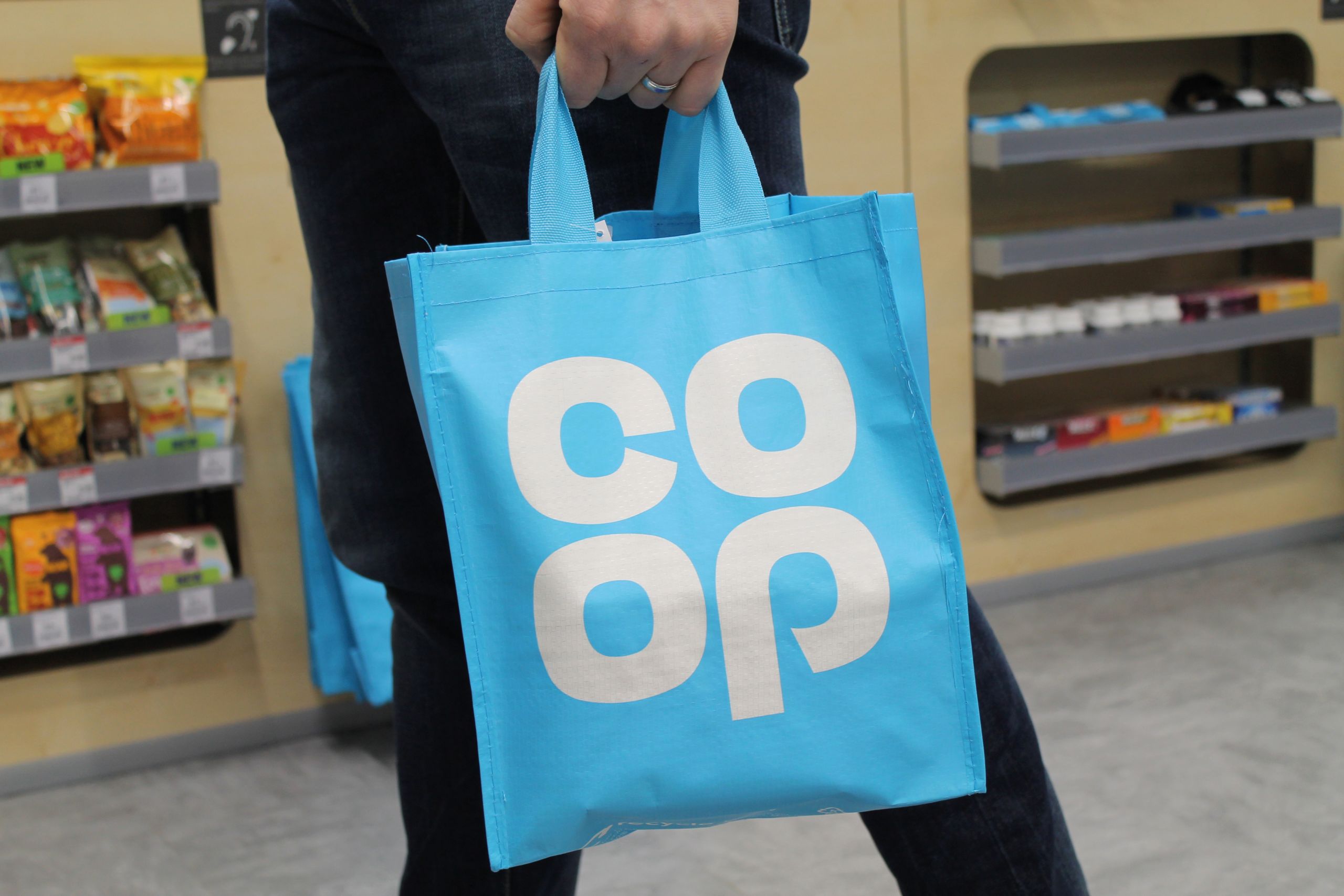
Credit: Co-Op
Credit: Co-Op
The Co-Op Food is the sixth biggest food retailer in the country. Although they are an £11billion a year business, they feature almost exclusively in small format stores in local areas. Paul Gerrard, Campaigns and Public Affairs Director at the Co-op, says their location means that they are more vulnerable to violence and theft.
Paul also highlighted the importance of the campaign, which has been on-going for 18 months:
"We have deployed all of the assets we have, as a business, into making sure our colleagues are safe both in the short and the long term.
"Part of the responsibility to keep our colleagues safe is ours. Over the past three and next three years, we will spend around £140million - over that six year period. This money will be spent on measures to protect colleagues in stores. That works out at around £8,000 per store, per year."
Due to the scale and importance of the campaign, Paul also believes that it has given colleagues a voice:
"We are very visible, much more than anybody else. It matters to our colleagues and it matters to our Co-Op. This campaign was not decided by the Chief Executive, nor is it made by the board. It is the organisation that decides to campaign on the issue; our national members counsel, who are 100 members elected by the membership to represent them.
"It is important to our members who own us and this gives us a real compelling voice."
Whilst both collaboration and campaigning are key to ensure the voice of shop workers is heard, there are differing opinions on what changes we might start to see.
Finally, below, you can see what experts think will happen over the coming years.
Words, filming and edit: Jamie Long
To republish any part of this project, please email me: jamielong1999@icloud.com


